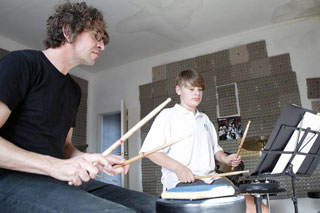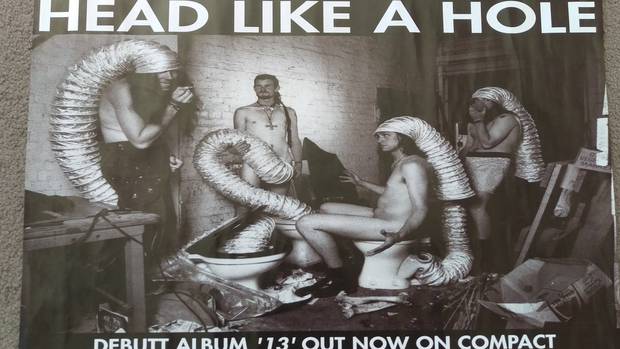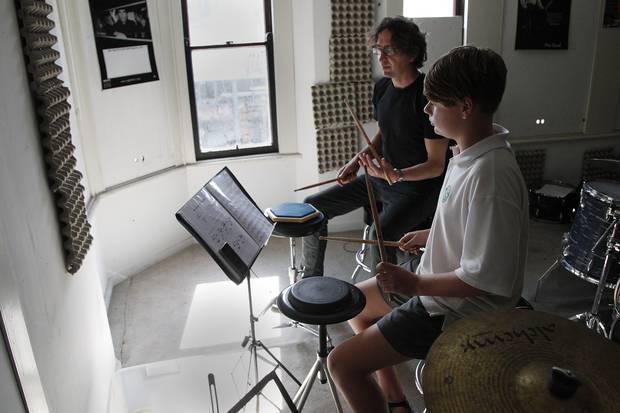Keeping the beat

Michael teaches WHS student Curtis Jurgen the drums at the Gat Shack.
PHOTOS / Stuart Munro
We settle in a cafe across the road, and he takes me back to where it all began. His first lessons started while attending school at Whanganui Boys College, under the guidance of local tutor Craig Thurston.
"Those early lessons were really rudiment-focused, which was amazing. Craig was also a John Bonham fanatic, so that pointed me in the right direction!"
He then took private classes with another Whanganui teacher called Arahi Hagger, who taught him how to read music notation.
This proved to be a revelation, as Michael was then able to study drum books and learn self-sufficiently, something he still does to this day.
"I'm still a complete active learner. It's important to always feel like you're growing, and moving forward in life."
After leaving school he studied psychology at Massey University, still learning drums independently through the use of books and theory.
"I always had this idea that I should have a secondary option other than music. Something to fall back on.
"As it turned out I got a job after I graduated, then I joined Head like A Hole! Within a month we had recorded HLAH 4, and I was playing in front of 500 angry people yelling at us to take our gear off!"
When Head Like A Hole came to an end in 2000, Michael joined the band Pluto, and spent the next nine years touring and recording. Their 2005 sophomore release Pipeline Under The Ocean remains a classic New Zealand guitar album, and achieved double platinum sales soon after its release.
As luck would have it, when that outfit called it quits in 2010, Head Like A Hole rose from the ashes once again and he has occupied their drum stool ever since.
The band has released two more records since their reformation, with another, their seventh, in the works.
HLAH are still a major live draw, most recently playing the Auckland City Limits and Rock in the Park festivals. Their latest single The End of Life was released at the end of 2017.
Aside from playing in two of NZ's most influential rock bands, Michael has taught drums actively for the past 20 years. I ask him about the way he goes about his lessons, and the most important things he tries to teach to his students. He is only too happy to divulge his secrets.
"I'm totally passionate about learning drums. First and foremost you have to make learning fun, especially when your student is younger. It has to be a fun thing to do. "The three things that I really try to get across first are rudiments, reading and getting around the kit to different songs."
He teaches at Rangitikei College, Whanganui High School, Collegiate and Girls' College and stresses the importance of adapting to the needs of the individual student in front of him. Different teaching approaches need to be used, as ages vary from new entrants to adults — the basics remain the same, however.
"It is important to prepare students for as many scenarios as possible, and helping them succeed in small tasks is really important in keeping things progressing."
The genre of jazz is something that he also encourages his students to explore, on top of whatever other styles they might be into. This was instilled in Michael by another former mentor, Auckland drummer Frank Gibson Jnr.
"Jazz is an improvised art form, so learning its fundamentals can really help you out in other areas, like listening to others and choosing notes and phrases. The history of the drum kit itself is also rooted in jazz."
While the internet offers a plethora of tutorials and lessons, Michael is quick to point out that being in the same room as an experienced drummer is hard to replicate, and can inspire students to continue push themselves forward.
"That human to human contact really makes a difference, but if you are in a remote area, the internet definitely offers an amazing amount of lessons. You just need to know what to look for."
Two decades of being in bands and a catalogue of session work has allowed Michael insight into what it takes to be part of an ensemble, and to successfully play with other musicians.
I tell him about my own history of "overplaying", but he assures me that experimenting and improvising is important in the evolution of a song. He suggests that trying too many things may simply be a "bad read of the situation", not necessarily something that should be avoided at all costs.
"The whole genre of jazz fusion is based on overplaying!", he laughs.
Michael asserts that the most important things to keep in mind when playing with others is understanding the situation and adapting accordingly.
"If you're playing with a Neil Finn or Bic Runga, it's probably best to leave your Meshuggah bass drum patterns at home!".
As our conversation winds down, I ask Michael about his own drumming influences and the figures who have shaped his playing over the years.
He immediately names legends such as Mitch Mitchell and Ginger Baker, along with heavy metal maestro Thomas Haake and jazz pioneer Philly Joe Jones. The list grows and grows, taking in musicians from all genres and eras.
I immediately reach for my notes to jot down some of the names he mentions. It turns out I'm learning too, just by sharing a drink with him in a quiet Whanganui café.
"As a teacher, if you yourself are actively learning and thinking of new ideas, the student will subconsciously pick up on that, and they will learn better off you. By being on that path of improvement you can sweep others up in the journey."
The next generation of drummers is definitely in good hands.
By Mike Tweed
Wanganui Chronicle 24/3/18


